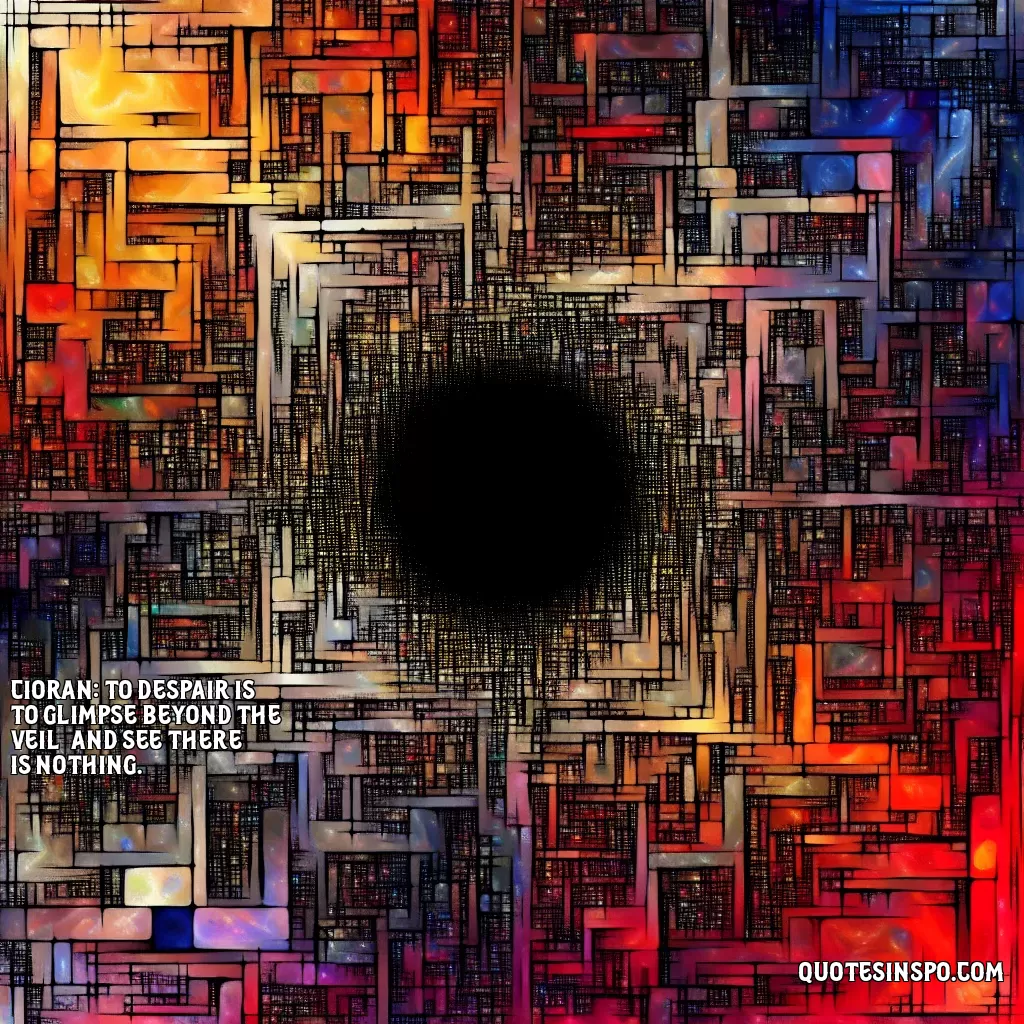
Cioran: To despair is to glimpse beyond the veil and see there is nothing.

Cioran: To despair is to glimpse beyond the veil and see there is nothing.
Emil Cioran, a Romanian philosopher known for his pessimistic and nihilistic views, often delved into themes of existential despair and the absurdity of life. The quote "To despair is to glimpse beyond the veil and see there is nothing" encapsulates his bleak perspective on existence and the human condition. At its core, this quote suggests that despair arises when one perceives a deeper truth about life—that beyond the superficial, comforting illusions (the "veil") that society and individuals construct, there exists a vast nothingness. This "nothing" is the existential void, a lack of inherent meaning or purpose in the world. For Cioran, despair is not merely an emotional state but a profound cognitive realization or revelation that the structures and narratives that give life meaning are ultimately baseless and hollow. By using the imagery of a veil, Cioran alludes to the idea that most people live under a veil of illusion or ignorance, comforted by cultural beliefs, religious structures, and personal goals. These constructs provide a sense of purpose and direction. However, when one "glimpses beyond" these illusions and confronts the raw reality of existence, despair ensues because one sees the absence of any definitive truth or purpose beyond this facade. In encountering this void, an individual may feel a profound sense of futility and insignificance, as the usual anchors of meaning have dissolved. Cioran’s view challenges us to grapple with the possibility that life, stripped of its veils, is devoid of inherent significance, prompting us to either find new pathways to meaning or resign ourselves to this existential despair.
Quote By: Emil Cioran
**Emil Cioran: A Life of Existential Inquiry**
Emil Cioran, born on April 8, 1911, in Rasinari, Romania, was a profound philosopher and essayist known for his poignant reflections on existence, despair, and the human condition. Cioran’s early education in Sibiu and Bucharest immersed him in a rich intellectual environment, where he was influenced by various philosophical traditions, including German idealism and existentialism. After completing his studies, he moved to Paris in 1937, where he spent the majority of his life, embracing the city's vibrant cultural landscape while distancing himself from his Romanian roots.
Cioran’s literary career is marked by a distinctive style that combines aphoristic writing with lyrical prose. His first major work, "On the Heights of Despair" (1934), reveals his deep existential angst and sets the tone for his future writings. Cioran's oeuvre often grapples with themes of nihilism, suffering, and the absurdity of life, reflecting his belief that despair is an inherent aspect of the human experience. His works, although initially met with limited attention, later garnered significant acclaim, capturing the interest of philosophers and literary figures alike.
Throughout his life, Emil Cioran wrote numerous books, including "The Trouble with Being Born" (1973) and "A Short History of Decay" (1949), where he delves into the futility of existence and the complexities of consciousness. His unique perspective, marked by a blend of humor and tragedy, invites readers to confront uncomfortable truths about life, death, and the nature of reality. Cioran's philosophical inquiries are steeped in a deep cynicism that resonates with readers who have navigated their crises of faith and identity.
Emil Cioran's impact extends beyond literature into the realms of philosophy and existential thought, and his works continue to influence contemporary discourse. He remained an enigmatic figure until his death on June 20, 1995, in Paris. Cioran’s legacy endures through his enduring writings, which challenge individuals to embrace the contradictions of existence and find meaning amid despair. His candid reflections ensure that he remains a vital voice in the exploration of human fragility and the search for understanding in an often bewildering world.